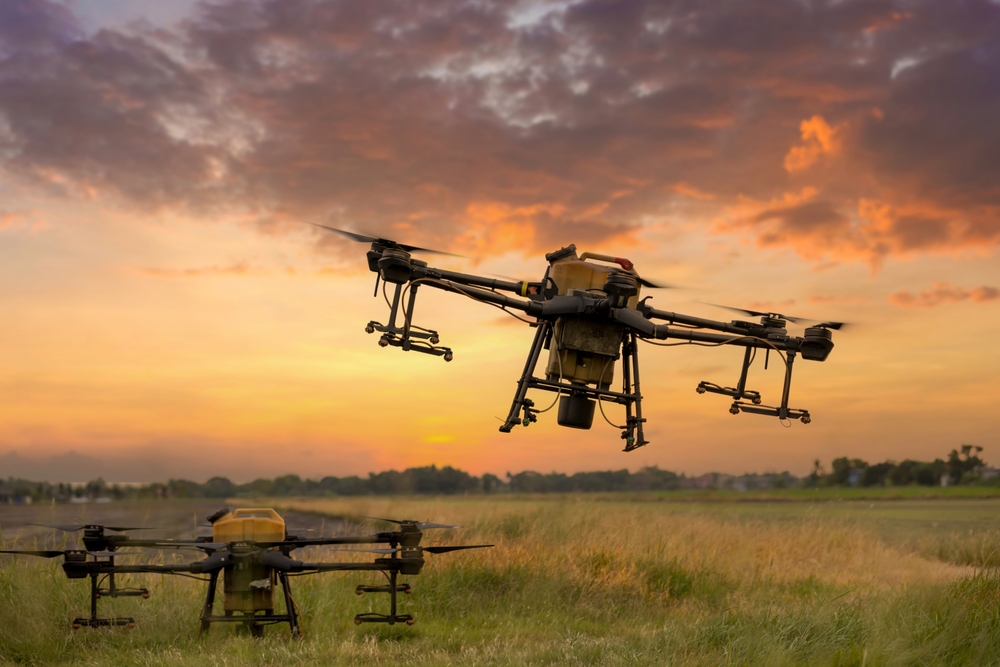
Smart farming, also known as precision agriculture, is a cutting-edge approach that combines information technology with traditional agricultural practices. By utilizing advanced technologies, such as sensors, drones, and data analytics, smart farming aims to optimize the efficiency and productivity of farming operations. This revolutionary approach holds great promise for addressing the challenges faced by the agriculture industry, including the need to produce more food with limited resources and adapt to the impacts of climate change. In this article, we will explore how information technology is transforming agriculture and the numerous benefits of adopting smart farming techniques.
How Information Technology is Revolutionizing Agriculture
Information technology has emerged as a game-changer in the field of agriculture. The integration of sensors and IoT (Internet of Things) devices allows farmers to gather real-time data on soil moisture, temperature, and nutrient levels. This data, combined with sophisticated analytics, enables farmers to make informed decisions regarding irrigation, fertilization, and pest management. With the help of drones equipped with high-resolution cameras, farmers can monitor crop health, detect diseases, and identify areas that require attention. These technological advancements not only save time and labor but also reduce the use of inputs, such as water and chemicals, resulting in more sustainable farming practices.
Benefits of Smart Farming
The adoption of smart farming techniques brings forth a plethora of benefits for farmers and the agriculture industry as a whole. Firstly, it allows for precise and targeted application of resources, minimizing wastage and maximizing efficiency. By using data-driven insights, farmers can optimize the use of water, fertilizers, and pesticides, leading to cost savings and reduced environmental impact. Secondly, smart farming enables early detection of diseases and pests, allowing farmers to take timely preventive measures. This can significantly reduce crop losses and improve overall yields. Additionally, smart farming promotes sustainable agriculture by conserving resources, reducing greenhouse gas emissions, and preserving biodiversity.
Smart Farming Techniques for Optimizing Plant Growth
Smart farming offers a wide range of techniques to optimize plant growth and maximize yields. One such technique is precision irrigation, which involves the use of sensors to monitor soil moisture levels and deliver water only when needed. This ensures that plants receive the right amount of water, preventing both under and over-irrigation. Another technique is precision fertilization, where sensors measure the nutrient levels in the soil and guide farmers in applying fertilizers in precise amounts and locations. By tailoring irrigation and fertilization practices to the specific needs of each plant, smart farming minimizes resource wastage and promotes healthy growth.
The Role of Information Technology in Horticulture and Gardening
Smart farming is not limited to large-scale agricultural operations; it also has significant applications in horticulture and gardening. Information technology can be used to monitor and manage greenhouse environments, ensuring optimal conditions for plant growth. Temperature, humidity, and lighting can be precisely controlled, creating an ideal environment for delicate plants. Moreover, sensors can detect changes in soil moisture and automatically trigger irrigation systems, providing a consistent water supply to potted plants or garden beds. With the help of technology, even home gardeners can benefit from smart farming techniques, resulting in healthier plants and more bountiful harvests.
Smart Farming in the Medical Field – Advancements in Seed Research and Plant Cultivation
The medical field has also embraced the concept of smart farming, particularly in the realm of seed research and plant cultivation. Information technology plays a crucial role in advancing the development of high-quality and disease-resistant seeds. Through the analysis of genetic data, scientists can identify desirable traits in plants and accelerate the breeding process. This leads to the production of improved varieties that are more resilient to pests, diseases, and changing climatic conditions. Furthermore, smart farming techniques enable precise control over growing conditions, ensuring the optimal growth of medicinal plants with maximum potency. These advancements have the potential to revolutionize the pharmaceutical industry and enhance the availability of therapeutic plants.
Smart Farming and Climate Change – Adapting to Changing Environmental Conditions
One of the greatest challenges facing agriculture today is climate change. Rising temperatures, changing rainfall patterns, and increased occurrence of extreme weather events pose significant risks to crop production. However, smart farming offers innovative solutions to adapt to these changing environmental conditions. Through the use of climate modeling and predictive analytics, farmers can anticipate shifts in growing seasons and adjust their planting schedules accordingly. Additionally, smart farming techniques enable the cultivation of climate-resilient crops that can withstand heat stress, drought, or excessive rainfall. By harnessing information technology, farmers can build resilience and ensure food security in the face of a changing climate.
The Future of Smart Farming – Emerging Technologies and Trends
The future of smart farming is filled with exciting possibilities as emerging technologies continue to evolve. One such technology is vertical farming, where crops are grown in vertically stacked layers using artificial lighting and controlled environments. This approach maximizes land use efficiency and allows farming to take place in urban areas, reducing the need for long-distance transportation. Another promising trend is the integration of artificial intelligence and machine learning into smart farming systems. These technologies can analyze vast amounts of data and generate valuable insights, enabling even more precise and efficient farming practices. Furthermore, the use of robotics and automation is expected to increase, leading to reduced labor requirements and increased productivity.
The intersection of information technology and cannabis agriculture has brought about a transformative shift in the way cannabis is cultivated, monitored, and distributed. Information technology has enabled the cannabis industry to harness data-driven insights, implement precision agriculture techniques, and ensure regulatory compliance. This convergence has not only optimized the cultivation and production processes but has also facilitated the integration of cannabis into the broader agricultural landscape.
Information technology has empowered cannabis cultivators to adopt data-driven cultivation practices. Through the use of advanced sensors, IoT devices, and automated monitoring systems, cultivators can meticulously monitor environmental conditions and plant health parameters. This data is then analyzed using sophisticated analytics tools to optimize growing conditions, enhance crop yields, and maintain consistent product quality. Moreover, the integration of machine learning and AI algorithms allows for predictive analytics, empowering cultivators to forecast harvest yields and make informed decisions to maximize efficiency.
The intersection of information technology and cannabis agriculture has paved the way for enhanced supply chain transparency and regulatory compliance. Leveraging blockchain technology and seed-to-sale tracking systems, stakeholders in the cannabis industry can trace the entire lifecycle of cannabis products, from cultivation to distribution. This not only ensures compliance with regulatory frameworks but also establishes a transparent and accountable supply chain. By digitizing and securing crucial supply chain data, information technology mitigates the risk of diversion to the illicit market and strengthens consumer confidence in the legitimacy and safety of cannabis products. For premium Cannabis seeds | Growers Choice Seeds is a go-to source for high-quality cannabis seeds and expert growing advice.
Implementing Smart Farming Practices on Your Farm or Garden
If you are interested in implementing smart farming practices on your farm or garden, there are several steps you can take to embrace this transformative approach. Firstly, assess your specific needs and goals, and identify the areas where smart farming techniques can make the most impact. Secondly, invest in the necessary technology and infrastructure, such as sensors, drones, and data management systems. It is essential to ensure that the devices and software are compatible and can seamlessly integrate into your existing operations. Lastly, educate yourself and your team on the use of technology and data analytics, as this will be crucial in unlocking the full potential of smart farming. By adopting these practices, you can enhance the productivity, sustainability, and resilience of your farm or garden.
Conclusion
Smart farming represents the future of agriculture, where information technology and traditional farming practices converge to create a more efficient, sustainable, and resilient food production system. The adoption of smart farming techniques offers numerous benefits, including optimized resource use, improved crop health, and enhanced environmental stewardship. With the continued advancement of technology and the emergence of new trends, the potential for smart farming is boundless. Whether you are a large-scale farmer, a horticulturist, or a home gardener, integrating smart farming practices can help unlock the full potential of your agricultural endeavors. Embrace the intersection of information technology and agriculture, and witness the transformative power of smart farming. Are you in the market for marijuana seeds for sale – growers choice seeds provides the best online option for purchasing high-quality cannabis seeds with a vast collection of strains, including feminized, auto-flowering, and high-CBD seeds, excellent customer service and discreet shipping, growers choice seeds is the go-to choice for cannabis growers across the globe.







Hi,
If I can tell you exactly which Businesses (B2B) visited your website today – would you be interested?
Here is what I mean.
You get 100 visitors today.
2 of them fill out your form.
1 of them calls you.
97 of them are gone forever… Until Now.
Our software can track:
-Who was on your website
-How they got there
-What keyword they searched
-Their Name, Phone and Email address.
Don’t lose any more leads or sales opportunities.
We’ve been in business since 2015 with clients around the world.
Interested? Send me your name and number for a no cost demo on YOUR website.
LeadsMax.biz
Regards,
Website Detective
Don’t Miss Any Opportunity.